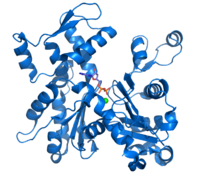
Photo from wikipedia
Background: Aortic dissection (AD) is a life-threatening cardiovascular disorder with high mortality and lacking underlying mechanisms or effective treatments. REGγ, the 11S proteasome activator known to promote the degradation of… Click to show full abstract
Background: Aortic dissection (AD) is a life-threatening cardiovascular disorder with high mortality and lacking underlying mechanisms or effective treatments. REGγ, the 11S proteasome activator known to promote the degradation of cellular proteins in a ubiquitin- and ATP-independent manner, emerges as a new regulator in the cardiovascular system. Methods: Using β-aminopropionitrile (BAPN)-subjected REGγ knockout AD mice and Ang II (angiotensin II)–treated REGγ deficiency vascular smooth muscle cells (VSMCs) to explore the effect of REGγ in AD progression. Results: REGγ was upregulated in mouse aorta of β-aminopropionitrile-induced AD model in vivo and Ang II–treated VSMCs in vitro. REGγ deficiency ameliorated AD progression in β-aminopropionitrile-induced mice by protecting against the switch in VSMCs from contractile to synthetic phenotype through suppressing RBM3 (RNA-binding motif protein 3) decay. Mechanically, REGγ interacted with and degraded the RNA-binding protein RBM3 directly, leading to decreased mRNA stability, lowered expression and transcriptional activity of transcription factor SRF (serum response factor), subsequently reduced transcription of VSMCs-specific contractile genes, α-SMA (alpha-smooth muscle actin) and SM22α (smooth muscle 22 alpha), caused the switch in VSMCs from contractile to synthetic phenotype and associated AD progression. Ablation of endogenous SRF or RBM3, or overexpressing exogenous RBM3 in VSMCs significantly blocked or reestablished the REGγ-dependent action on VSMCs phenotypic switch of Ang II stimulation in vitro. Furthermore, exogenously introducing RBM3 improved the switch in VSMCs from contractile to synthetic phenotype and associated AD features caused by REGγ in vivo. Conclusions: Our results demonstrated that REGγ promoted the switch in VSMCs from contractile to synthetic phenotype and AD progression by inhibiting RBM3-SRF pathway, indicated that modulating REGγ-proteasome activity may be a potential therapeutic approach for AD-associated cardiovascular dysfunction.
Journal Title: Hypertension
Year Published: 2022
Link to full text (if available)
Share on Social Media: Sign Up to like & get
recommendations!